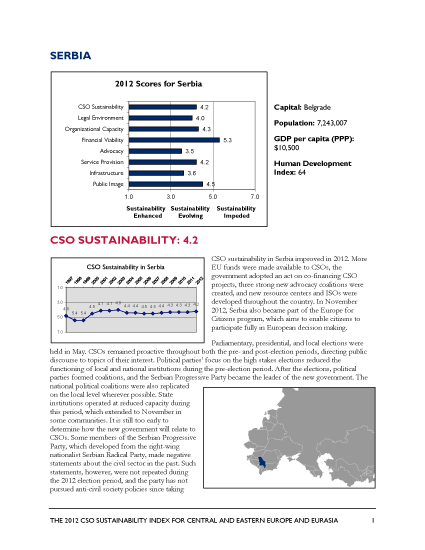Speeches Shim
CSO SUSTAINABILITY: 4.2
CSO sustainability in Serbia improved in 2012. More EU funds were made available to CSOs, the government adopted an act on co-financing CSO projects, three strong new advocacy coalitions were created, and new resource centers and ISOs were developed throughout the country. In November 2012, Serbia also became part of the Europe for Citizens program, which aims to enable citizens to participate fully in European decision making.
Parliamentary, presidential, and local elections were held in May. CSOs remained proactive throughout both the pre- and post-election periods, directing public discourse to topics of their interest. Political parties’ focus on the high stakes elections reduced the functioning of local and national institutions during the pre-election period. After the elections, political parties formed coalitions, and the Serbian Progressive Party became the leader of the new government. The national political coalitions were also replicated on the local level wherever possible. State institutions operated at reduced capacity during this period, which extended to November in some communities. It is still too early to determine how the new government will relate to CSOs. Some members of the Serbian Progressive Party, which developed from the right-wing nationalist Serbian Radical Party, made negative statements about the civil sector in the past. Such statements, however, were not repeated during the 2012 election period, and the party has not pursued anti-civil society policies since taking office.
According to the Serbian Business Registry Office, as of November 2012, there were 18,544 citizens associations (an increase, for reasons that are unclear, of almost 15 percent over the past year), 46 foreign associations, and just over 400 foundations and endowments registered in the country.


Comment
Make a general inquiry or suggest an improvement.